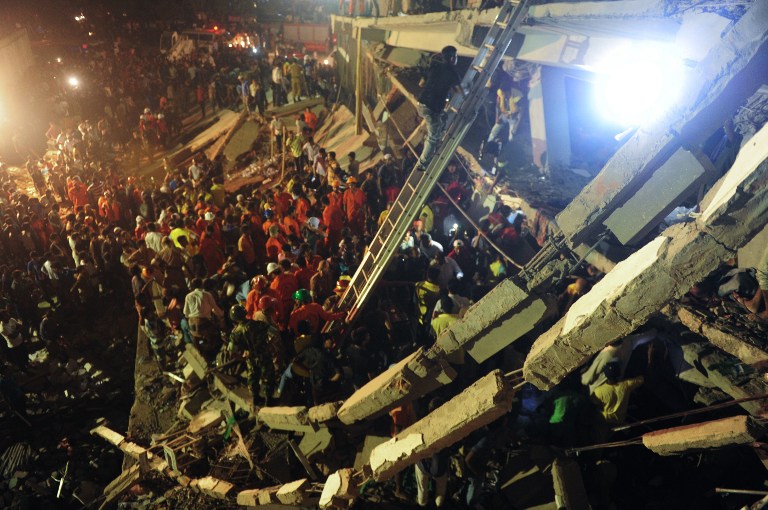SUMMARY
This is AI generated summarization, which may have errors. For context, always refer to the full article.

SAVAR, Bangladesh (3rd UPDATE) – The death toll from Bangladesh’s worst industrial disaster reached 250 on Thursday, April 25, after rescue workers pulled out more bodies from the rubble of a factory compound.
“The death toll is now 250,” Moshiuddowla Reza, a senior police officer of Dhaka district, told AFP from the disaster site, adding more bodies were being recovered and that most of those who died are female garments workers.
More than 1,000 people were injured when the site housing a number of garment factories on the outskirts of Dhaka imploded on Wednesday, allegedly after managers ignored workers’ warnings that the building had become unstable.
Flags flew at half-mast as the shell-shocked country declared a day of mourning for the victims of the country’s worst factory disaster, which highlighted anew safety concerns in Bangladesh’s vital garment industry.
Hundreds of thousands of garment workers walked out of their factories to protest the deaths.
Grief turned to anger as the workers, some carrying sticks, blockaded key highways in at least three industrial areas just outside the capital Dhaka, forcing factory owners to declare a day’s holiday.
“There were hundreds of thousands of them,” said Abdul Baten, police chief of Gazipur district, where hundreds of large garment factories are based. “They occupied roads for a while and then dispersed.”
Police inspector Kamrul Islam said the workers had attacked several factories whose bosses had refused to give employees the day off.
Rescue workers could still hear screams coming from the wreckage about 24 hours after the building collapsed, police said.
Working with cutters and drilling machines, fire service and army rescue workers pulled out at least six people alive during the night after sending food and oxygen through holes in the rubble, Asraf said.
The accident has once again highlighted the safety problems and poor working conditions that plague the textile industry in Bangladesh, the world’s second-biggest clothing exporter which supplies global retailers.
Last November, a blaze at a factory making apparel for Walmart and other Western labels in Dhaka left 111 people dead, with survivors describing how fire exits were kept locked by site managers.
Jeopardizing safety
Tessel Pauli, a spokeswoman for the Amsterdam-based Clean Clothes Campaign, said the latest disaster was “symptomatic” of problems in Bangladesh where foreign buyers are accused of jeopardizing safety in their search for profit.
“These accidents represent a failure of these brands to make safety a priority. They know what needs to be done and they are not doing it,” Pauli told AFP.
Low-cost British clothing chain Primark said that one of its suppliers was based in the 8-story Rana Plaza in the town of Savar that collapsed at about 9:00 am (0300 GMT) on Wednesday.
“The company is shocked and deeply saddened by this appalling incident at Savar, near Dhaka, and expresses its condolences to all of those involved,” it said in a statement.
Walmart said it was investigating to see if any factories in the Rana Plaza building had been among its suppliers. Spanish fashion label Mango and Benetton of Italy said none of their own Bangladeshi suppliers was involved.
Survivors complained that the building had developed cracks on Tuesday evening, triggering an evacuation of the roughly 3,000 garment workers employed there, but that they had been ordered back to the production lines.
“The managers forced us to rejoin and just one hour after we entered the factory the building collapsed with a huge noise,” said a 24-year-old worker who gave her first name as Mousumi.
Police officer Monir Hossain said a case had been filed against the owner of the building, a ruling party official, for violating construction laws. Another case was underway against the factory owners.
Mustafizur Rahman, head of a police unit created to handle industrial problems, said the factory owners had gone into hiding and had ignored a warning not to reopen the building.
“After looking at the cracks on Tuesday, we told them to keep the plants shut. They defied our call,” he told AFP. – Rappler.com
Add a comment
How does this make you feel?
There are no comments yet. Add your comment to start the conversation.